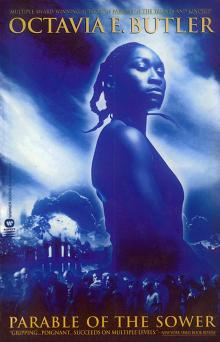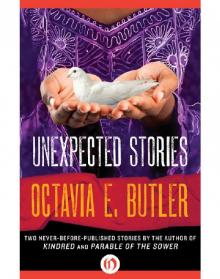- Home
- Octavia E. Butler
Lilith's Brood: Dawn, Adulthood Rites, and Imago (Xenogenesis Trilogy) Page 2
Lilith's Brood: Dawn, Adulthood Rites, and Imago (Xenogenesis Trilogy) Read online
Page 2
She frowned, strained to see, to understand. Then, abruptly, she did understand. She backed away, scrambled around the bed and to the far wall. When she could go no farther, she stood against the wall, staring at him.
Medusa.
Some of the “hair” writhed independently, a nest of snakes startled, driven in all directions.
Revolted, she turned her face to the wall.
“They’re not separate animals,” he said. “They’re sensory organs. They’re no more dangerous than your nose or eyes. It’s natural for them to move in response to my wishes or emotions or to outside stimuli. We have them on our bodies as well. We need them in the same way you need your ears, nose, and eyes.”
“But …” She faced him again, disbelieving. Why should he need such things—tentacles—to supplement his senses?
“When you can,” he said, “come closer and look at me. I’ve had humans believe they saw human sensory organs on my head—and then get angry with me when they realized they were wrong.”
“I can’t,” she whispered, though now she wanted to. Could she have been so wrong, so deceived by her own eyes?
“You will,” he said. “My sensory organs aren’t dangerous to you. You’ll have to get used to them.”
“No!”
The tentacles were elastic. At her shout, some of them lengthened, stretching toward her. She imagined big, slowly writhing, dying night crawlers stretched along the sidewalk after a rain. She imagined small, tentacled sea slugs—nudibranchs—grown impossibly to human size and shape, and, obscenely, sounding more like a human being than some humans. Yet she needed to hear him speak. Silent, he was utterly alien.
She swallowed. “Listen, don’t go quiet on me. Talk!”
“Yes?”
“Why do you speak English so well, anyway? You should at least have an unusual accent.”
“People like you taught me. I speak several human languages. I began learning very young.”
“How many other humans do you have here? And where’s here?”
“This is my home. You could call it a ship—a vast one compared to the ones your people have built. What it truly is doesn’t translate. You’ll be understood if you call it a ship. It’s in orbit around your Earth, somewhat beyond the orbit of Earth’s moon. As for how many humans are here: all of you who survived your war. We collected as many as we could. The ones we didn’t find in time died of injury, disease, hunger, radiation, cold. … We found them later.”
She believed him. Humanity in its attempt to destroy itself had made the world unlivable. She had been certain she would die even though she had survived the bombing without a scratch. She had considered her survival a misfortune—a promise of a more lingering death. And now … ?
“Is there anything left on Earth?” she whispered. “Anything alive, I mean.”
“Oh, yes. Time and our efforts have been restoring it.”
That stopped her. She managed to look at him for a moment without being distracted by the slowly writhing tentacles. “Restoring it? Why?”
“For use. You’ll go back there eventually.”
“You’ll send me back? And the other humans?”
“Yes.”
“Why?”
“That you will come to understand little by little.”
She frowned. “All right. I’ll start now. Tell me.”
His head tentacles wavered. Individually, they did look more like big worms than small snakes. Long and slender or short and thick as. … As what? As his mood changed? As his attention shifted? She looked away.
“No!” he said sharply. “I’ll only talk to you, Lilith, if you look at me.”
She made a fist of one hand and deliberately dug her nails into her palm until they all but broke the skin. With the pain of that to distract her, she faced him. “What’s your name?” she asked.
“Kaaltediinjdahya lel Kahguyaht aj Dinso.”
She stared at him, then sighed, and shook her head.
“Jdahya,” he said. “That part is me. The rest is my family and other things.”
She repeated the shorter name, trying to pronounce it exactly as he had, to get the unfamiliar ghost j sound just right. “Jdahya,” she said, “I want to know the price of your people’s help. What do you want of us?”
“Not more than you can give—but more than you can understand here, now. More than words will be able to help you understand at first. There are things you must see and hear outside.”
“Tell me something now, whether I understand it or not.”
His tentacles rippled. “I can only say that your people have something we value. You may begin to know how much we value it when I tell you that by your way of measuring time, it has been several million years since we dared to interfere in another people’s act of self-destruction. Many of us disputed the wisdom of doing it this time. We thought … that there had been a consensus among you, that you had agreed to die.”
“No species would do that!”
“Yes. Some have. And a few of those who have have taken whole ships of our people with them. We’ve learned. Mass suicide is one of the few things we usually let alone.”
“Do you understand now what happened to us?”
“I’m aware of what happened. It’s … alien to me. Frighteningly alien.”
“Yes. I sort of feel that way myself, even though they’re my people. It was … beyond insanity.”
“Some of the people we picked up had been hiding deep underground. They had created much of the destruction.”
“And they’re still alive?”
“Some of them are.”
“And you plan to send them back to Earth?”
“No.”
“What?”
“The ones still alive are very old now. We’ve used them slowly, learned biology, language, culture from them. We Awakened them a few at a time and let them live their lives here in different parts of the ship while you slept.”
“Slept … Jdahya, how long have I slept?”
He walked across the room to the table platform, put one many-fingered hand on it, and boosted himself up. Legs drawn against his body, he walked easily on his hands to the center of the platform. The whole series of movements was so fluid and natural, yet so alien that it fascinated her.
Abruptly she realized he was several feet closer to her. She leaped away. Then, feeling utterly foolish, she tried to come back. He had folded himself compactly into an uncomfortable-looking seated position. He ignored her sudden move—except for his head tentacles which all swept toward her as though in a wind. He seemed to watch as she inched back to the bed. Could a being with sensory tentacles instead of eyes watch?
When she had come as close to him as she could, she stopped and sat on the floor. It was all she could do to stay where she was. She drew her knees up against her chest and hugged them to her tightly.
“I don’t understand why I’m so … afraid of you,” she whispered. “Of the way you look, I mean. You’re not that different. There are—or were—life forms on Earth that looked a little like you.”
He said nothing.
She looked at him sharply, fearing he had fallen into one of his long silences. “Is it something you’re doing?” she demanded, “something I don’t know about?”
“I’m here to teach you to be comfortable with us,” he said. “You’re doing very well.”
She did not feel she was doing well at all. “What have others done?”
“Several have tried to kill me.”
She swallowed. It amazed her that they had been able to bring themselves to touch him. “What did you do to them?”
“For trying to kill me?”
“No, before—to incite them.”
“No more than I’m doing to you now.”
“I don’t understand.” She made herself stare at him. “Can you really see?”
“Very well.”
“Colors? Depth?”
“Yes.”
Yet it
was true that he had no eyes. She could see now that there were only dark patches where tentacles grew thickly. The same with the sides of his head where ears should have been. And there were openings at his throat. And the tentacles around them didn’t look as dark as the others. Murkily translucent, pale gray worms.
“In fact,” he said, “you should be aware that I can see wherever I have tentacles—and I can see whether I seem to notice or not. I can’t not see.”
That sounded like a horrible existence—not to be able to close one’s eyes, sink into the private darkness behind one’s own eyelids. “Don’t you sleep?”
“Yes. But not the way you do.”
She shifted suddenly from the subject of his sleeping to her own. “You never told me how long you kept me asleep.”
“About … two hundred and fifty of your years.”
This was more than she could assimilate at once. She said nothing for so long that he broke the silence.
“Something went wrong when you were first Awakened. I heard about it from several people. Someone handled you badly—underestimated you. You are like us in some ways, but you were thought to be like your military people hidden underground. They refused to talk to us too. At first. You were left asleep for about fifty years after that first mistake.”
She crept to the bed, worms or no worms, and leaned against the end of it. “I’d always thought my Awakenings might be years apart, but I didn’t really believe it.”
“You were like your world. You needed time to heal. And we needed time to learn more about your kind.” He paused. “We didn’t know what to think when some of your people killed themselves. Some of us believed it was because they had been left out of the mass suicide—that they simply wanted to finish the dying. Others said it was because we kept them isolated. We began putting two or more together, and many injured or killed one another. Isolation cost fewer lives.”
These last words touched a memory in her. “Jdahya?” she said.
The tentacles down the sides of his face wavered, looked for a moment like dark, muttonchop whiskers.
“At one point a little boy was put in with me. His name was Sharad. What happened to him?”
He said nothing for a moment, then all his tentacles stretched themselves upward. Someone spoke to him from above in the usual way and in a voice much like his own, but this time in a foreign language, choppy and fast.
“My relative will find out,” he told her. “Sharad is almost certainly well, though he may not be a child any longer.”
“You’ve let children grow up and grow old?”
“A few, yes. But they’ve lived among us. We haven’t isolated them.”
“You shouldn’t have isolated any of us unless your purpose was to drive us insane. You almost succeeded with me more than once. Humans need one another.”
His tentacles writhed repulsively. “We know. I wouldn’t have cared to endure as much solitude as you have. But we had no skill at grouping humans in ways that suited them.”
“But Sharad and I—”
“He may have had parents, Lilith.”
Someone spoke from above, in English this time. “The boy has parents and a sister. He’s asleep with them, and he’s still very young.” There was a pause. “Lilith, what language did he speak?”
“I don’t know,” Lilith said. “Either he was too young to tell me or he tried and I didn’t understand. I think he must have been East Indian, though—if that means anything to you.”
“Others know. I was only curious.”
“You’re sure he’s all right?”
“He’s well.”
She felt assured at that and immediately questioned the emotion. Why should one more anonymous voice telling her everything was fine reassure her?
“Can I see him?” she asked.
“Jdahya?” the voice said.
Jdahya turned toward her. “You’ll be able to see him when you can walk among us without panic. This is your last isolation room. When you’re ready, I’ll take you outside.”
3
JDAHYA WOULD NOT LEAVE her. As much as she had hated her solitary confinement, she longed to be rid of him. He fell silent for a while and she wondered whether he might be sleeping—to the degree that he did sleep. She lay down herself, wondering whether she could relax enough to sleep with him there. It would be like going to sleep knowing there was a rattlesnake in the room, knowing she could wake up and find it in her bed.
She could not fall asleep facing him. Yet she could not keep her back to him long. Each time she dozed, she would jolt awake and look to see if he had come closer. This exhausted her, but she could not stop doing it. Worse, each time she moved, his tentacles moved, straightening lazily in her direction as though he were sleeping with his eyes open—as he no doubt was.
Painfully tired, head aching, stomach queasy, she climbed down from her bed and lay alongside it on the floor. She could not see him now, no matter how she turned. She could see only the platform beside her and the walls. He was no longer part of her world.
“No, Lilith,” he said as she closed her eyes.
She pretended not to hear him.
“Lie on the bed,” he said, “or on the floor over here. Not over there.”
She lay rigid, silent.
“If you stay where you are, I’ll take the bed.”
That would put him just above her—too close, looming over her, Medusa leering down.
She got up and all but fell across the bed, damning him, and, to her humiliation, crying a little. Eventually she slept. Her body had simply had enough.
She awoke abruptly, twisting around to look at him. He was still on the platform, his position hardly altered. When his head tentacles swept in her direction she got up and ran into the bathroom. He let her hide there for a while, let her wash and be alone and wallow in self-pity and self-contempt. She could not remember ever having been so continually afraid, so out of control of her emotions. Jdahya had done nothing, yet she cowered.
When he called her, she took a deep breath and stepped out of the bathroom. “This isn’t working,” she said miserably. “Just put me down on Earth with other humans. I can’t do this.”
He ignored her.
After a time she spoke again on a different subject. “I have a scar,” she said, touching her abdomen. “I didn’t have it when I was on Earth. What did your people do to me?”
“You had a growth,” he said. “A cancer. We got rid of it. Otherwise, it would have killed you.”
She went cold. Her mother had died of cancer. Two of her aunts had had it and her grandmother had been operated on three times for it. They were all dead now, killed by someone else’s insanity. But the family “tradition” was apparently continuing.
“What did I lose along with the cancer?” she asked softly.
“Nothing.”
“Not a few feet of intestine? My ovaries? My uterus?”
“Nothing. My relative tended you. You lost nothing you would want to keep.”
“Your relative is the one who … performed surgery on me?”
“Yes. With interest and care. There was a human physician with us, but by then she was old, dying. She only watched and commented on what my relative did.”
“How would he know enough to do anything for me? Human anatomy must be totally different from yours.”
“My relative is not male—or female. The name for its sex is ooloi. It understood your body because it is ooloi. On your world there were vast numbers of dead and dying humans to study. Our ooloi came to understand what could be normal or abnormal, possible or impossible for the human body. The ooloi who went to the planet taught those who stayed here. My relative has studied your people for much of its life.”
“How do ooloi study?” She imagined dying humans caged and every groan and contortion closely observed. She imagined dissections of living subjects as well as dead ones. She imagined treatable diseases being allowed to run their grisly courses in order for ooloi to lea
rn.
“They observe. They have special organs for their kind of observation. My relative examined you, observed a few of your normal body cells, compared them with what it had learned from other humans most like you, and said you had not only a cancer, but a talent for cancer.”
“I wouldn’t call it a talent. A curse, maybe. But how could your relative know about that from just … observing.”
“Maybe perceiving would be a better word,” he said. “There’s much more involved than sight. It knows everything that can be learned about you from your genes. And by now, it knows your medical history and a great deal about the way you think. It has taken part in testing you.”
“Has it? I may not be able to forgive it for that. But listen, I don’t understand how it could cut out a cancer without … well, without doing damage to whichever organ it was growing on.”
“My relative didn’t cut out your cancer. It wouldn’t have cut you at all, but it wanted to examine the cancer directly with all its senses. It had never personally examined one before. When it had finished, it induced your body to reabsorb the cancer.”
“It … induced my body to reabsorb … cancer?”
“Yes. My relative gave your body a kind of chemical command.”
“Is that how you cure cancer among yourselves?”
“We don’t get them.”
Lilith sighed. “I wish we didn’t. They’ve created enough hell in my family.”
“They won’t be harming you anymore. My relative says they’re beautiful, but simple to prevent.”
“Beautiful?”
“It perceives things differently sometimes. Here’s food, Lilith. Are you hungry?”
She stepped toward him, reaching out to take the bowl, then realized what she was doing. She froze, but managed not to scramble backward. After a few seconds, she inched toward him. She could not do it quickly—snatch and run. She could hardly do it at all. She forced herself forward slowly, slowly.
Teeth clenched, she managed to take the bowl. Her hand shook so badly that she spilled half the stew. She withdrew to the bed. After a while she was able to eat what was left, then finish the bowl. It was not enough. She was still hungry, but she did not complain. She was not up to taking another bowl from his hand. Daisy hand. Palm in the center, many fingers all the way around. The fingers had bones in them, at least; they weren’t tentacles. And there were only two hands, two feet. He could have been so much uglier than he was, so much less … human. Why couldn’t she just accept him? All he seemed to be asking was that she not panic at the sight of him or others like him. Why couldn’t she do that?

 Patternmaster
Patternmaster Survivor
Survivor Clay's Ark
Clay's Ark Bloodchild and Other Stories
Bloodchild and Other Stories Parable of the Sower
Parable of the Sower Wild Seed
Wild Seed Fledgling
Fledgling Unexpected Stories
Unexpected Stories Kindred
Kindred Lilith's Brood: Dawn / Adulthood Rites / Imago
Lilith's Brood: Dawn / Adulthood Rites / Imago Adulthood Rites
Adulthood Rites Mind of My Mind
Mind of My Mind Seed to Harvest
Seed to Harvest Lilith's Brood: Dawn, Adulthood Rites, and Imago (Xenogenesis Trilogy)
Lilith's Brood: Dawn, Adulthood Rites, and Imago (Xenogenesis Trilogy) Bloodchild
Bloodchild Seed to Harvest: Wild Seed, Mind of My Mind, Clay's Ark, and Patternmaster (Patternist)
Seed to Harvest: Wild Seed, Mind of My Mind, Clay's Ark, and Patternmaster (Patternist)